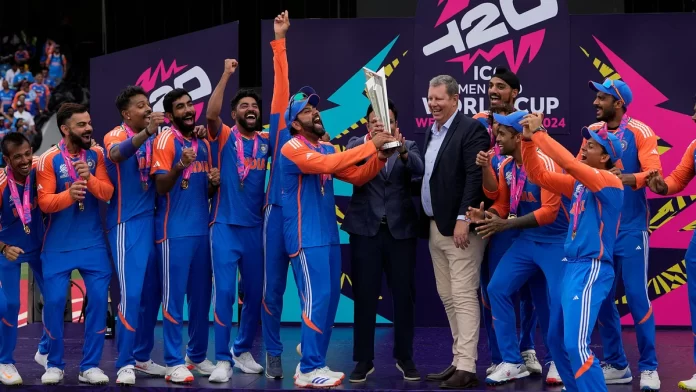How India managed to crack the T20 game at last: You might be wondering whether curse the Indian team has finally broken: the 13-year wait for a World Cup victory since the 2011 ODI trophy, or the 11-year absence of an ICC trophy since the 2013 Champions Trophy? or 17 years after winning the first T20 World Cup?
All three may be true, but the most important one might be ending the T20 wait after seven global events without trophies, in a format that the world is familiar with and will grow much more popular following the 2028 Olympics.
Every time India enters the global cricket arena, they have to deal with the insult of being the team with the greatest resources, while Australia must defend its reputation as a serial champion and South Africa must battle its dark past in the knockout stages.
Every time they lose, there are rumours that their schedule was specifically designed for the Indian television audience. This isn’t always true because there are instances when it works against them, but they also carry the stigma of being the “bling boys,” the biggest winners of the best T20 league in the history of the sport, and being unfit to play modern cricket.
Captain Rohit Sharma will always remember winning the 2024 title because he experienced it all as a 20-year-old in 2007 with MS Dhoni’s team. With this victory, India also made up for the disappointment of the 2014 championship match, in which 2007 winner Yuvraj Singh tripped and never got back up. In the semi-final of 2016, India was shown how far behind the T20 curve by the West Indies marauders. They had no chance in 2021. India’s inferiority to the greatest teams was demonstrated by victors England in 2022, Rohit’s first World Cup as captain.
India’s class of 2024 changed the course of the USA-West Indies competition by dominating the other teams and going undefeated through eight games (the Canada match was cancelled) in the most unpredictable format. India managed to win with just 12 players, demonstrating the level of preparation they had – Sanju Samson, Yashasvi Jaiswal, and Yuzvendra Chahal weren’t even needed.
Strategies for success
India has historically produced an abundance of skilled players and match-winners. However, traditional qualities are rarely enough to bring home T20 titles.
The most significant tactical change made by India was to start all of their all-round players from the first game, including seamers Shivam Dube and Hardik Pandya and left-arm spinners Axar Patel and Ravindra Jadeja. Axar did a great job considering that he was told he would be a batting floater.
Hardik needed to improve all around, and he succeeded in doing so, winning the match on the final over. Though they never reached their maximum potential, Jadeja and Dube increased the batting depth and gave the top order the freedom to bat, which is an essential luxury in the absence of the IPL’s Impact player rule.
To be honest, this is a two-year trip. This is a journey that extends beyond the T20 World Cup. Head coach Rahul Dravid stated, “When I think about how we put this team together, the kind of skills we wanted, the players we wanted, those conversations started in (late) 2021.”
It culminated, in my opinion, in this World Cup. There’s been a lot of work put into the letdown of the Australia 2022 T20 World Cup and the subsequent 2023 one-day World Cup. It seems as though everything we have attempted to construct and produce has come together here on this lovely Barbados afternoon.
In contrast, India discovered the ideal blueprint for the circumstances, substituting an extra seamer for the West Indies pitches with an extra spinner in the USA. A T20 match won’t always be so conducive to bowling.
The game of cricket is embracing a power-hitting-driven future, and Indian cricket is fortunate to have a wide range of players who are willing to adopt this new paradigm. All one needs to do is consider how good the Indian team chosen to play Zimbabwe in the forthcoming Twenty20 International series is.
The timing of Rohit’s, Virat Kohli’s, and Ravindra Jadeja’s T20I retirements ensures that the 2024 victory feels like the result of a more planned shift in strategy rather than the coincidental triumph of 2007.
































